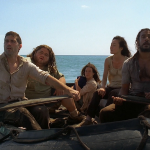 Continuing in the same vein as Part 1, Parts 2&3 was mostly action/adventure and little mythology. And what little there was still seems to support my theory.
Continuing in the same vein as Part 1, Parts 2&3 was mostly action/adventure and little mythology. And what little there was still seems to support my theory.
For starters, at the end of the last episode’s update, I wrote:
In “Something Nice Back Home” Hurley even suggests that none of them made it off the island, and they were, perhaps dead. Not dead, just stuck in limbo between worlds. I feel like the season will end with the five of them not being rescued as we think, but getting hurt, and this whole flash-forward has all been in their minds.
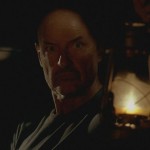 You can always be sure that the Locke-centric episodes will focus more on mythology than action and this episode didn’t disappoint. Between Locke’s creepy dream of Horace Goodspeed, his exploration of Jacob’s cabin, his conversation with Christian Shephard and an eerily entranced Claire, and the flashback scenes hinting at his strange childhood with appearances by an unchanged Richard Alpert, there were more than enough mysteries to keep fans occupied.
You can always be sure that the Locke-centric episodes will focus more on mythology than action and this episode didn’t disappoint. Between Locke’s creepy dream of Horace Goodspeed, his exploration of Jacob’s cabin, his conversation with Christian Shephard and an eerily entranced Claire, and the flashback scenes hinting at his strange childhood with appearances by an unchanged Richard Alpert, there were more than enough mysteries to keep fans occupied.
 This episode had a really good mix of suspense and mystery, closer to Seasons 1 & 2 Lost. Early on in the episode, we get a flash-forward of Jack where he goes to visit Hurley in the Santa Rosa Mental Hospital. Hurley hasn’t been taken his meds because he believes that he and the other Oceanic Six are all dead and that none of them actually made it off the island. Hurley asks Jack about his day and Jack tells him of his life now with Kate and Aaron. Hurley compares Jack’s life with Kate to heaven. Hurley then mentions that he still sees Charlie and talks to him and Charlie had a message for Jack: that he’s “not supposed to raise him,” apparently referring to Aaron. Hurley then tells Jack that he would also be getting a visit from someone soon. That person winds up being Jack’s father, who Jack sees clearly sitting on the couch at the hospital where he works. So are Charlie and Jack’s father still alive? The simulation theory presented in “The Myth of Lost” predicted that they were, but not in the ghostly way that they’ve been appearing on the show.
This episode had a really good mix of suspense and mystery, closer to Seasons 1 & 2 Lost. Early on in the episode, we get a flash-forward of Jack where he goes to visit Hurley in the Santa Rosa Mental Hospital. Hurley hasn’t been taken his meds because he believes that he and the other Oceanic Six are all dead and that none of them actually made it off the island. Hurley asks Jack about his day and Jack tells him of his life now with Kate and Aaron. Hurley compares Jack’s life with Kate to heaven. Hurley then mentions that he still sees Charlie and talks to him and Charlie had a message for Jack: that he’s “not supposed to raise him,” apparently referring to Aaron. Hurley then tells Jack that he would also be getting a visit from someone soon. That person winds up being Jack’s father, who Jack sees clearly sitting on the couch at the hospital where he works. So are Charlie and Jack’s father still alive? The simulation theory presented in “The Myth of Lost” predicted that they were, but not in the ghostly way that they’ve been appearing on the show.
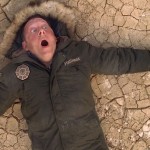 This is the first episode written after the writer’s strike, and to me, it felt like it. The story was rushed, the dialogue seemed out of place for the characters (i.e., Sawyer telling Ben that he’d kill him if he harmed on hair on Hurley’s head—since when does Sawyer care that much about anyone but himself?), and the action was kind of unbelievable at times (Sayid turning his head all the way around to notice Ben photographing him from atop a building behind him). In spite of this, or perhaps because of it, I also found this episode pretty funny.
This is the first episode written after the writer’s strike, and to me, it felt like it. The story was rushed, the dialogue seemed out of place for the characters (i.e., Sawyer telling Ben that he’d kill him if he harmed on hair on Hurley’s head—since when does Sawyer care that much about anyone but himself?), and the action was kind of unbelievable at times (Sayid turning his head all the way around to notice Ben photographing him from atop a building behind him). In spite of this, or perhaps because of it, I also found this episode pretty funny.
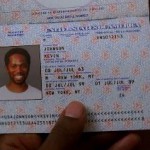 The first thing that stuck me as interesting in this episode was Michael, a.k.a., Kevin Johnson, responding to Sayid’s question about what he was doing there by saying that he was there to die. After watching the full episode, we may assume that he was referring to his repeated attempts at suicide, but if “The Myth of Lost” simulation theory is correct, Michael may be talking about something else—his desire to die and get out of the simulation already.
The first thing that stuck me as interesting in this episode was Michael, a.k.a., Kevin Johnson, responding to Sayid’s question about what he was doing there by saying that he was there to die. After watching the full episode, we may assume that he was referring to his repeated attempts at suicide, but if “The Myth of Lost” simulation theory is correct, Michael may be talking about something else—his desire to die and get out of the simulation already.
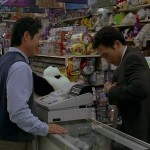 If nothing else, this episode certainly proved that the writers are still at the top of their game, using creative use of flashbacks and flash-forwards to offer an intriguing twist. I also think it gave a lot of weight to “The Myth of Lost” simulation theory, and some of the sub-theories related to it.
If nothing else, this episode certainly proved that the writers are still at the top of their game, using creative use of flashbacks and flash-forwards to offer an intriguing twist. I also think it gave a lot of weight to “The Myth of Lost” simulation theory, and some of the sub-theories related to it.
 One of the recurring themes of Lost, involves a character named Desmond who is able to jump his consciousness around to the past and future of his life. Last season, Desmond’s mind traveled back in time with his memories in tact. This enabled him to predict everything that would happen as he remembered it. Last week, the consciousness from Desmond’s past jumped into his present, and had no idea what was going on. If you think this is confusing, I’m only scratching the surface of this episode.
One of the recurring themes of Lost, involves a character named Desmond who is able to jump his consciousness around to the past and future of his life. Last season, Desmond’s mind traveled back in time with his memories in tact. This enabled him to predict everything that would happen as he remembered it. Last week, the consciousness from Desmond’s past jumped into his present, and had no idea what was going on. If you think this is confusing, I’m only scratching the surface of this episode.
Like the writers of Lost, I’ve always been fascinated with the idea of being able to communicate with the past and future versions of ourselves.
 The episode begins within the flashback of “Other” woman Juliet where she meets fellow Other, Harper Stanhope. We learn that Harper is a psychologist to the Others and married to Goodwin, who Juliet later has an affair with, making her the other woman from Harper’s perspective. Of course, the other woman may also be Harper herself from Juliet’s perspective. Either way, the fact that Harper is a psychologist definitely fits in with The Myth of Lost simulation theory because of one of its major points: that many of the Others are providing therapy to the Losties. If this were true, just as in our world, therapists see their own therapists regularly. So, having a resident shrink on the island is a big boost to the simulation theory.
The episode begins within the flashback of “Other” woman Juliet where she meets fellow Other, Harper Stanhope. We learn that Harper is a psychologist to the Others and married to Goodwin, who Juliet later has an affair with, making her the other woman from Harper’s perspective. Of course, the other woman may also be Harper herself from Juliet’s perspective. Either way, the fact that Harper is a psychologist definitely fits in with The Myth of Lost simulation theory because of one of its major points: that many of the Others are providing therapy to the Losties. If this were true, just as in our world, therapists see their own therapists regularly. So, having a resident shrink on the island is a big boost to the simulation theory.
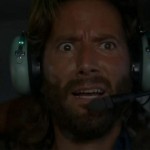 Besides being vastly intriguing, another reason I love “The Constant” is because it gets back to the mythology that’s been mostly missing this season. In this episode, we see that Desmond’s mind is moving back and forth between his life in and around the island, and his life in the so-called real world. Even though he’s not on the island during the time-jumps, he’s still apart of it. He may even still be in the simulation. In The Myth of Lost, I mention how the Portuguese guys who contact Penny from some frigid region are also within the simulation—just another part of it. Similarly, it is entirely possible that Desmond is still in the simulation, but only the area in and around the island is affected by the glitch. As Desmond crossed through the infected area of the simulation, it may have infected him, bringing about the time-jumps in his consciousness as his mind is hooked up to the program.
Besides being vastly intriguing, another reason I love “The Constant” is because it gets back to the mythology that’s been mostly missing this season. In this episode, we see that Desmond’s mind is moving back and forth between his life in and around the island, and his life in the so-called real world. Even though he’s not on the island during the time-jumps, he’s still apart of it. He may even still be in the simulation. In The Myth of Lost, I mention how the Portuguese guys who contact Penny from some frigid region are also within the simulation—just another part of it. Similarly, it is entirely possible that Desmond is still in the simulation, but only the area in and around the island is affected by the glitch. As Desmond crossed through the infected area of the simulation, it may have infected him, bringing about the time-jumps in his consciousness as his mind is hooked up to the program.
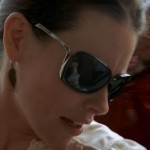 I loved this episode, not so much because it was a particularly good episode, which, mythologically speaking, it wasn’t, but because of it’s cool pop culture references. First it had Hurley watching the 1980 cult classic, Xanadu, which was so random, it was hilarious. Secondly, it had Kate using an old cartoon trick to fool Hurley into telling her where Locke was hiding Miles. Upon figuring out that he’d been tricked, Hurley says, “You just totally Scooby-Doo’d me, didn’t you?”
I loved this episode, not so much because it was a particularly good episode, which, mythologically speaking, it wasn’t, but because of it’s cool pop culture references. First it had Hurley watching the 1980 cult classic, Xanadu, which was so random, it was hilarious. Secondly, it had Kate using an old cartoon trick to fool Hurley into telling her where Locke was hiding Miles. Upon figuring out that he’d been tricked, Hurley says, “You just totally Scooby-Doo’d me, didn’t you?”
 Continuing in the same vein as Part 1, Parts 2&3 was mostly action/adventure and little mythology. And what little there was still seems to support my theory.
Continuing in the same vein as Part 1, Parts 2&3 was mostly action/adventure and little mythology. And what little there was still seems to support my theory.









